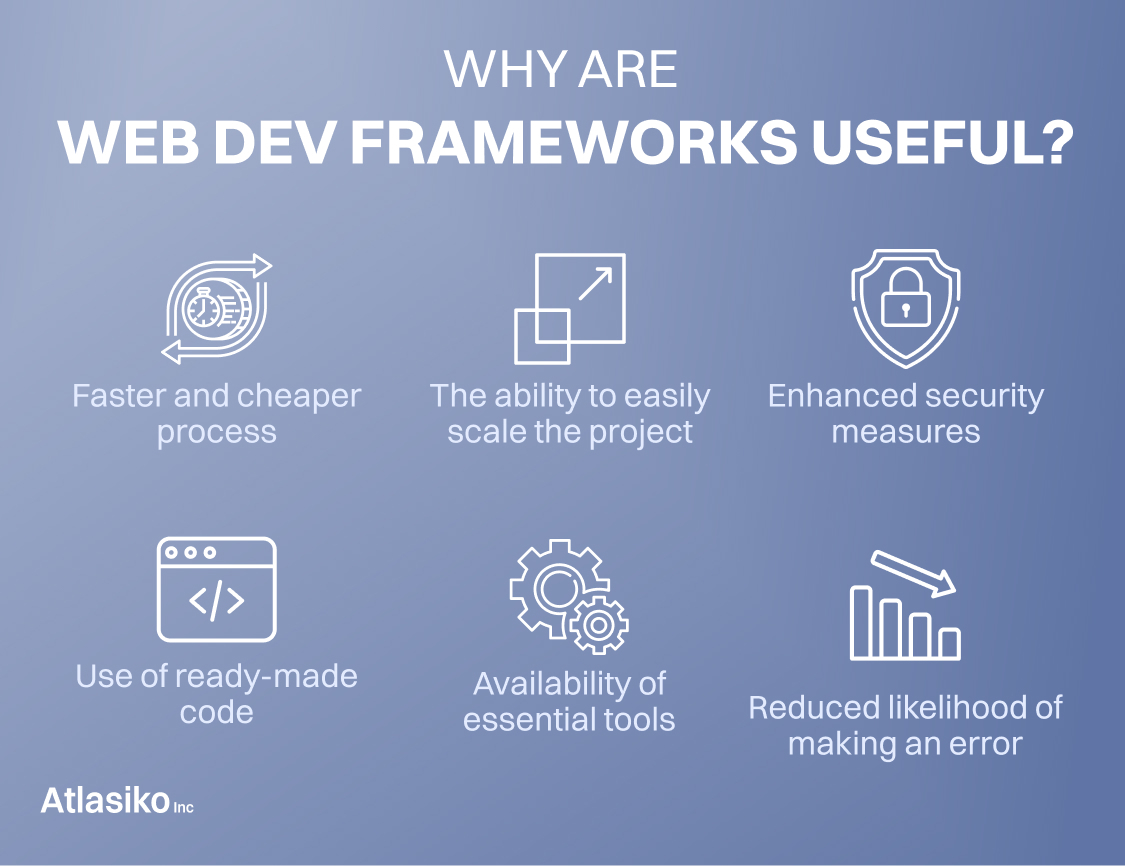Today, web developers cannot imagine their work without frameworks that make their lives significantly easier while developing sites or apps. Indeed, these toolkits help users not only to create web elements but speed up this process, and structure work logically.
In this comprehensive article, we will present you with detailed information, so you will find out the answer to the issue of “What is a web framework?” in greater depth, and discover why they are so necessary in the modern information world.
What Are Web Development Frameworks?
Whether you are an experienced developer or a newbie in IT, it is useful to learn all opportunities for using frameworks while creating web units and generally to clarify what a framework in web development is to ensure productive work.
Web development frameworks (WDFs) are a collection of instruments and resources for developers’ work that allow them to create, organize, and manage different web pieces such as sites, services, applications, and APIs (application programming interfaces). The framework for web development includes a set of parts:
- Basic codes;
- Functions;
- Rules;
- Subsystems;
- Utilities.
These components serve as comprehensive assistants for creating both websites and web applications. Simply saying, it is a “skeleton” for development sparing users the need to create components from the ground up. Additionally, web development frameworks can also have names such as web application frameworks (WAF) or web frameworks (WF), instead of web development frameworks.
With the help of this software environment, programmers can fulfill only steps based on the logic and specific peculiarities of their product. Moreover, this infrastructure of software solutions facilitates the development of complex large-scale tasks and allows the implementation of non-standard solutions. The usage of this set of resources notably simplifies the process of development and saves time. So, frameworks for web development are tools that become the foundation when you start building web products.
Why Are Web Dev Frameworks Useful?
Web frameworks are very powerful instruments for web development, providing users with some wide opportunities that can be handy while coding. They can enhance the procedure of creating sites and give users the ability to reach the top of programming. Here, we'll present these advantages of the web dev framework:

- Faster and cheaper process: If you use frameworks in web development, you can reduce time and costs. By incorporating frameworks into your workflow, you will focus on more specific operations and functionalities rather than basic and repetitive ones. As a result, you can fulfill your work resources more effectively.
- Availability of essential tools: The web development framework is equipped with a rich array of subsystems, templates, and other tools that do their job well during the web development of apps, sites, services, and other digital platforms, thereby excelling in developing processes;
- Enhanced security measures: Framework in web development offers standardized methods to safeguard against a wide variety of potential attacks and guarantee robust defense during the whole procedure;
- Use of ready-made code: Frameworks provide readily applicable solutions for specific tasks. You can use already-written code from a library, thereby not only improving efficiency but also ensuring well-established best practices.
- The ability to easily scale the project: The advantage of using website development frameworks allows effortlessly to add new components and increase system capacity as needed. It allows us to achieve goals in programming more easily.
- Reduced likelihood of making an error: Because the frameworks are equipped with ready-made tools and written codes, the probability of making errors during the initial stages diminishes.
These benefits of web development frameworks put in demand in the process of developing websites and applications and greatly help developers in their work. Frameworks are lifesavers for the web platform development process, rendering them an indispensable tool that significantly eases the workload for developers.
Types of Framework for Web Development
When it comes to the categorization of web development frameworks, there are four distinct types that are responsible for certain functions during web development. We encounter the fundamental categories that play essential roles in shaping the digital landscape: back-end, front-end, testing, and meta- frameworks. In the following section, we will describe in detail each of these types to enhance your comprehension.
Back-end Frameworks
These frameworks for web development (also well-known as server-side frameworks) focus on the inner structure of digital platform creation. Server-side developers build an architecture that is not visible to users, so it does not apply to the interface. Back-end developers are responsible for displaying URLs, managing HTTP requests, ensuring security, and so on. To accomplish these tasks, programmers commonly employ languages such as Python, Java, Ruby, C#, and PHP. The most common back-end frameworks you can use in your work are:
- Django, Web2Py, Flask, Bottle, CherryPy for Python;
- Spring, Struts, Hibernate, JSF (Java Server Faces), Apache Wicket for Java;
- Ruby on Rails, Sinatra, Hanami, Grape, Cuba for the Ruby language;
- ASP.NET Core, NUnit, Entity Framework Core for C#;
- Laravel, Zend, Symfony; CakePHP, Yii 2 for the PHP language.
Front-end Frameworks
Unlike back-end frameworks, which handle operations only with servers, front-end frameworks (or client-side frameworks) are responsible for the interface, so they directly interact with users. Front-end frameworks are equipped with a variety of ready-to-use codes and templates that allow developers to perform different animations, single-page applications, creative interfaces, etc. To make these operations, you can use three basic programming languages such as HTML, CSS, and JavaScript with the help of popular front-end frameworks we presented below:
- Foundation, Onsen UI for HTML;
- Bootstrap, Tailwind CSS, Foundation, Bulma, and Skeleton for the CSS language.
- Angular, React, Vue.js, Ember.js, Meteor for JavaScript.
Test Automation Frameworks
If you appreciate your time and company finances, this framework type will be a lifesaver for a company. The set of instructions and algorithms will allow you to provide the quality testing process and not use extra maintenance. Test automation frameworks also assist in avoiding mistakes during the writing of codes, and not being distracted by unnecessary actions. Below are various test frameworks that are at your disposal for utilization in a wide array of testing:
- Selenium for Java, JavaScript, C#, Python, Ruby.
- Playwright for JavaScript, Python, Java, C#.
- Cypress and TestCafe are only for JavaScript.
- Appium for Python, Ruby, Java, C#, and PHP.
- Cucumber for Java and JavaScript.
Meta-Frameworks
The next type of framework is characterized by its wide range of uses and is defined as a more complex type. These frameworks, commonly referred to as "frameworks of frameworks," include simpler frameworks within their scope. So, they allow developers to perform multiplex and advanced operations, offering a broad spectrum of applications. Here are a few illustrative examples:
- SvelteKit for HTML, CSS and JavaScript.
- Meteor, React for JavaScript.
- Django for Python.
- Astro for HTML.
- Ruby on Rails (RoR) for Ruby.
All of these frameworks are essential assistance for web developers that enable them to create secure, creative multifunctional, and visually appealing web platforms. Together these types of frameworks complement each other, facilitating the work of developers.
If you need to apply frameworks in your work and learn more about their peculiarities and uses, Atlasiko’s specialists in web development can help you with any questions.
Conclusion
We believe this article helped you to discover an answer to the question “What is a web framework?” and you learned all the peculiarities and opportunities of different framework types while you are coding. Therefore, we hope you are convinced of the benefits and use of frameworks in web platform creation. If you want to learn more about web development frameworks and delve deeper into the process of development, our specialists will make every effort to help you. Follow Atlasiko’s web development blog and you will find more articles about the creation of websites.








Optimal meta-frameworks are those. however I would prefer to see Nuxt on your list
meta-frameworks are the best. would like to see Nuxt in your list tho
Thank you for your comment. We totally agree with you on the matter of meta-frameworks. Nuxt is one of our preferred frameworks too, we'll make sure to include it in our next article.